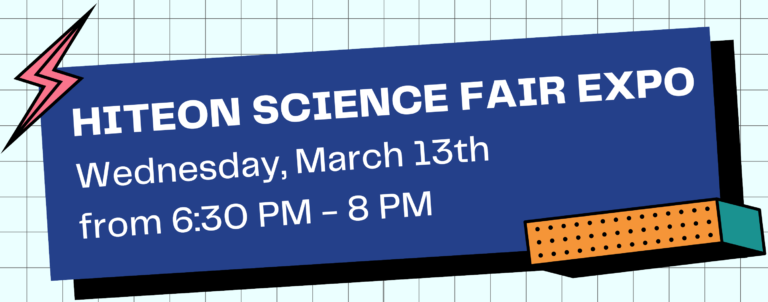
It's time to let those scientific minds fly and design an experiment reflecting your curiosity and interests.
SAVE THE DATE! The Science Fair is Wednesday, March 13th!
Deadline for registration is on Thursday, February 22nd.
Each entry (individual or team) receives a free project display board to be sent home on Friday, February 23rd.
Pick a project idea and sign up, either individually or with Hiteon friends/siblings. Up to four students may work together. Only one entry form is needed per project. The parent signing the form must ensure that all parents are aware and in agreement. (Students should only officially participate in 1 project registered for the Science Fair Expo.)
You may work with your family to do your project, but remember it should be your work and your words explaining it!
Bring your completed project board to school anytime between 6:00PM – 6:30PM on the night of the Expo (Wednesday, March 13th). Project reviewing will begin at 6:30 PM with projects done by Kindergarteners and progressing by grade through fifth graders. Once your project is reviewed, you can pick up your participation prize! This is not a competition, so relax, have fun, and enjoy!
Keep in mind – Beaverton School District rules apply. SAFETY FIRST!
Although it might be exciting to bring materials used during your experiment to display in from of your board, some items are not ok to bring to school. Please refer to the below list of items not allowed with your display. If in doubt, use drawings or pictures to provide evidence of your experiment.
NOT allowed at display:
- Living organisms – plants or animals or dead parts of animals or plants;
- Dirt, soil, bark chips or sand;
- Aerosol bottles or other pressurized gases;
- Hazardous or flammable chemicals. All other chemicals and liquids, including water, must be in permanently sealed, unbreakable containers;
- Hazardous substances or devices including lasers;
- Sharp items or weapons (including toy guns);
- Anything that needs to be plugged in;
- Flames or highly flammable items;
- Liquids not contained in sealed, unbreakable containers;
- Any human or animal food;
- Balloons;
- Glass.
REGISTER FOR THE SCIENCE FAIR EXPO!
Here are the Science Fair project guidelines to show the four types of projects your student can do for the expo, along with graphics that show a sample project set up on a project board.
Remember: any question that can be tested will make a good project. So, what are you interested in exploring? Don’t forget to take notes so you can prepare your project slides, and help us understand what you did and what you learned. Here are the basic steps to building a science project:
- Ask a question (e.g. Which solutions remove stains fastest?)
- Form a hypothesis, or a proposed explanation (e.g. Bleach removes stains fastest because it is a strong base.)
- Design a test to answer that question (e.g. Compare bleach with other solutions, such as ordinary detergent, vinegar, hydrogen peroxide, etc.)
- Perform the experiment and record the results (e.g. Bleach was fastest, but all the other solutions had roughly equal stain-removing power.)
- Write a conclusion by comparing the results to your hypothesis. (e.g. The results were as I expected, but to my surprise, none of the other solutions were better than the other.)
- Discuss what went right and/or what went wrong. Suggest ideas for future experiments (e.g. In the future, I will test the same solutions on different types of stains or different fabrics.)
Here’s a list of Scientists and Inventors that you can learn about! Links are books from the Washington County Cooperative Library Services (WCCLS) that you can put on hold.
- Elizabeth Blackwell – Elizabeth Blackwell: First Woman Doctor
- Ellen Ochoa – The Astronaut with a Song for the Stars
- Ernest Everett Just – The Vast Wonder of the World
- Eugenie Clark – Shark Lady
- June Almedia – June Almedia, Virus Detective!
- Katherine Johnson –Counting the Stars
- Jeanne Power – Secrets of the Sea
- Jocelyn Bell Burnell – Listening to the Stars
- John Herrington – Mission to Space
- Mae Jemison – Mae Jemison and Mae Jemison: Awesome Astronaut
- Margaret Hamilton – Margaret and the Moon: How Margaret Hamilton Save the First Lunar Landing
- Marie Tharp – Marie’s Ocean: Marie Tharp Maps the Mountains under the Sea
- Marjory Stoneman Douglas – A Voice for the Everglades
- Mary Golda Ross – Classified: The Secret Career of Mary Golda Ross, Cherokee Aerospace Engineer
- Nancy Grace Roman – Always Looking Up
- Neil deGrasse Tyson – Starstuck
- Rosalyn Sussman Yalow – Rosalyn Sussman Yalow
- Stephen Hawking – Stephen Hawking
- Temple Grandin – The Girl Who Thought in Pictures: The Story of Dr. Temple Grandin
- Tu Youyou – Tu Youyou’s Discovery
- Vera Rubin – The Stuff Between the Stars
- Williamina Stevens Fleming – She Caught the Light
- Wu Chien Shiung – Queen of Physics
- Notable Women in STEM (list created by Carmel Clay Public Library staff)
- Shaking Things Up by Susan Hood: 14 Young Women Who Changed the World
- Remarkable Minds: 17 more pioneering women in science & medicine
- Women Who Made History: Inventors and Scientists
- Learn about Women in STEM (list created by WCCLS)
